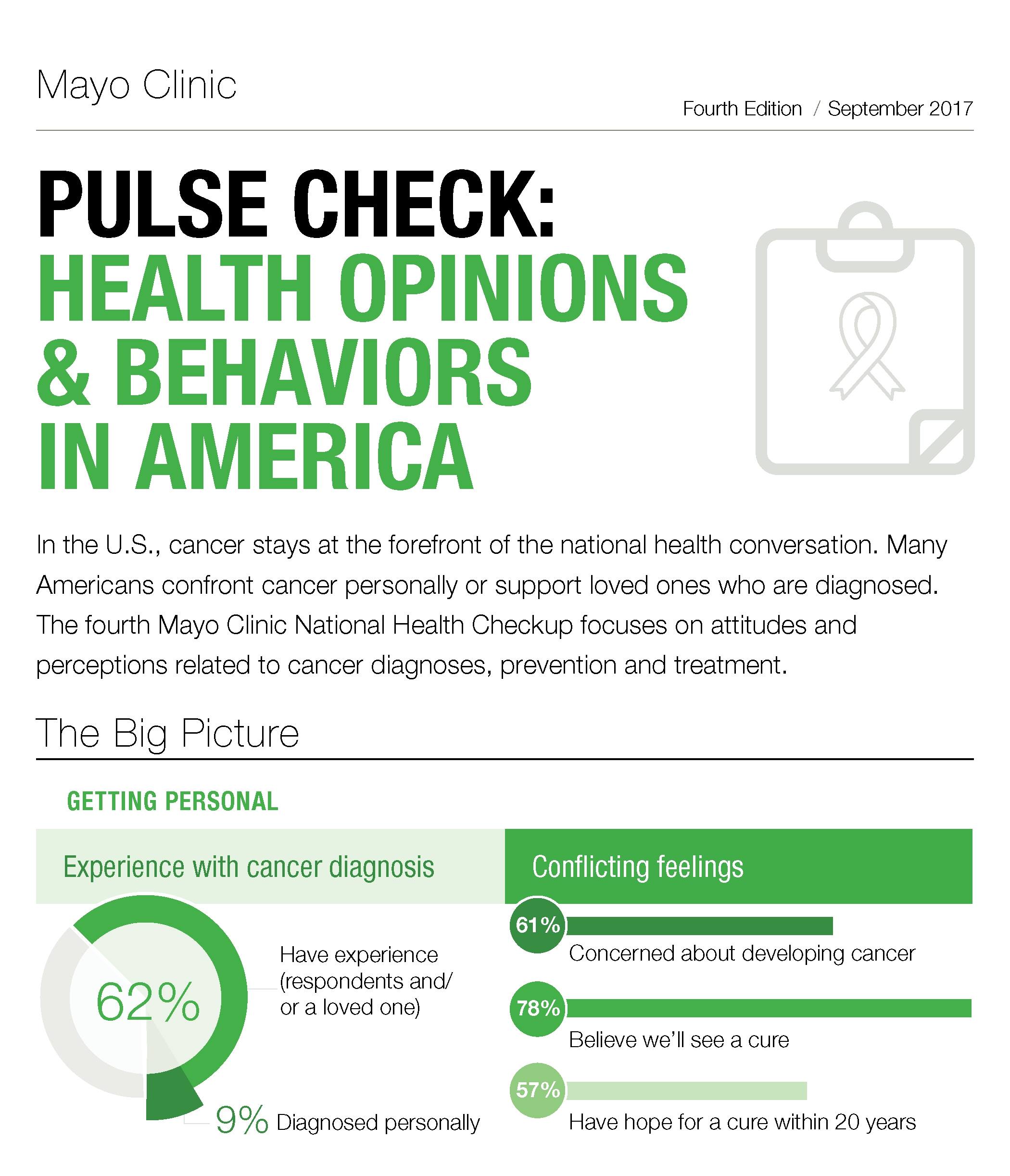-
Cancer
Mayo Clinic National Health Checkup: Nearly all Americans take at least one preventive measure to avoid cancer
ROCHESTER, Minn. – Cancer is a real concern for many Americans. According to the fourth edition of the Mayo Clinic National Health Checkup, 95 percent of respondents take at least one preventive measure to avoid cancer. Approximately three-fourths avoid smoking (75 percent), limit alcohol consumption (74 percent) and maintain a healthy diet (72 percent). And women are significantly more likely than men to do all three.
The Mayo Clinic National Health Checkup, first launched in January 2016, provides a quick pulse on consumer health opinions and behaviors at multiple times throughout the year.
“Cancer affects millions of Americans each year, including those in treatment and those supporting their loved ones. It’s not easy to talk about cancer, but this edition of the Mayo Clinic National Health Checkup opens the door for dialogue,” says Minetta Liu, M.D., medical oncologist at Mayo Clinic. “The better we understand national attitudes and actions toward health, the better equipped we’ll be to educate and empower healthy decisions.”
Many Americans have experience with cancer – and almost all are taking action
Most Americans (62 percent) have experienced a cancer diagnosis personally or through a loved one. When asked about the future, they expressed apprehension and optimism. While 61 percent said that they are very or somewhat concerned about developing cancer in their lifetime, 78 percent said that they believe we will see a cure for cancer. Fifty-seven percent hope cancer will be cured within the next 20 years.
Still, Americans are taking the time to educate themselves and make healthy lifestyle choices that may help them avoid cancer:
- Nine in 10 Americans are aware of their family’s medical history when it comes to cancer.
- Women are significantly more likely than men to take preventive measures, including discussing risk and prevention with their health care provider, sleeping the recommended number of hours and receiving recommended routine cancer screenings.
“The good news is that many positive lifestyle choices that promote overall health and wellness can also play a role in decreasing the risk of cancer,” says Dr. Liu. “Genetics are a factor in some cancers, but almost all cancers develop spontaneously with contributions from environmental and lifestyle factors. It is always a good idea to maintain a healthy diet, engage in physical activity and stay away from smoking.”
Costs and time are top barriers to diagnosis and treatment
Survey respondents considered hypothetical situations involving cancer and their actual experiences. If they noticed a possible cancer symptom, respondents listed two primary factors that would affect going to see a health care provider. Financial concerns or insurance coverage were cited most frequently (46 percent) and time available to schedule and attend appointments (41 percent) was second. Citing the financial and insurance concerns more frequently were Hispanics (64 percent), millennials (59 percent) and African-Americans (57 percent).
Among respondents who have been diagnosed with cancer – or have a loved one who has been diagnosed – roughly two-thirds reported barriers to obtaining care. These barriers included personal finances or cost (52 percent), insurance (42 percent) and schedule availability (29 percent). Millennials and those from Generation X (both 72 percent) were more likely than baby boomers (49 percent) to name financial concerns or insurance coverage as barriers.
Click to see the entire National Health Checkup infographic.
Preventive gaps exist: HPV vaccine, skin cancer and colorectal screenings
While two-thirds of respondents (67 percent) associate at least one type of cancer with HPV, less than one-third (30 percent) say that they, their children or their spouse has received the HPV vaccine or plan to receive it. Those who say they have not received the vaccine or do not plan to receive it cite questions about the safety or effectiveness of the vaccine (54 percent), or simply don’t know about it (48 percent). This poses a risk, as many different types of cancer are linked to HPV, including virtually all cases of cervical cancer.
The survey also showed a disconnect when it came to skin cancer. Most (91 percent) of Americans would be comfortable discussing lumps or spots they find on their skin with a health care provider. However, only half (52 percent) have had a formal skin check. And just one-fourth get their skin checked annually. Such appointments should be a priority for the 20 percent of Americans who have used a tanning bed – and the 4 percent who still do.
An early diagnosis for colorectal cancer is best for successful treatment; yet, less than half of patients are diagnosed at an early stage, according to the American Cancer Society. Noninvasive colon cancer screenings offer a promising option, and 85 percent of Americans say they would use a noninvasive screening if available. However, more than half of Americans (59 percent) are not aware of the Cologuard test for colon cancer, a DNA stool test developed in partnership with Mayo Clinic that can be conducted from home. This test – if determined suitable for a patient’s individual needs and circumstances by his or her doctor – detects early-stage colon cancer 94 percent of the time.
“Cancer is formidable, but it’s encouraging to see survival rates increasing for many types of cancer. This change is fueled by improvements in cancer screening and treatment, like Cologuard and the HPV vaccine,” says Dr. Liu. “At Mayo Clinic, we provide the most comprehensive cancer care available today, but we’re also researching and developing new methods of prevention to benefit all Americans in the future.”
###
About the Mayo Clinic National Health Checkup
The Mayo Clinic National Health Checkup was conducted in July 2017 through an ORC International Telephone Caravan Omnibus survey of 1,124 adults (18 years and older) living in the continental U.S. Learn more at healthcheckup.mayoclinic.org.
About Mayo Clinic
Mayo Clinic is a nonprofit organization committed to clinical practice, education and research, providing expert, comprehensive care to everyone who needs healing. For more information, visit mayoclinic.org/about-mayo-clinic or newsnetwork.mayoclinic.org.
MEDIA CONTACT
Kelly Reller, Mayo Clinic Public Affairs, 507-284 5005, newsbureau@mayo.edu








